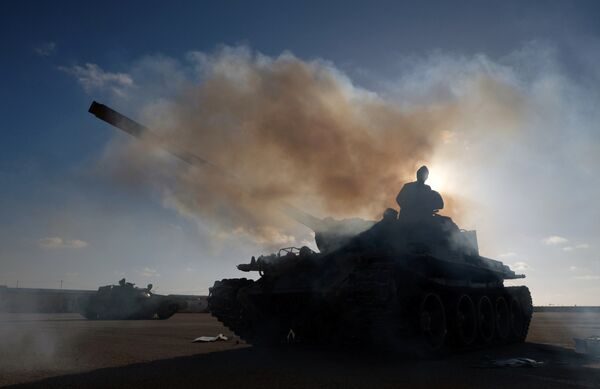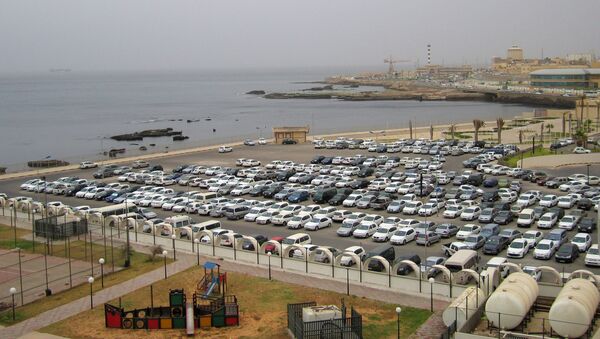“We have an important topic, of course, this is Libya”, Putin told reporters ahead of his meeting with French President Emmanuel Macron in Fort Bregancon last week.
“We need to seek reconciliation of the warring parties [in Libya]. And I would very much like to find out France’s position on this issue in order to coordinate our efforts”, Putin said.
Given that both countries have strong contacts in Tripoli and Benghazi, can cooperation between Paris and Moscow produce effective results?
Moncef Djaziri, Associate Professor at the Institute for Political and International Studies at the University of Lausanne believes that a consensus on the Libyan crisis is growing between the two countries.
Since there were no final declarations made by the heads of state, as the scholar pointed out, “we can only put forward hypotheses”: “It can be assumed that this consensus won’t be ignored by the Security Council and it will be proposed to agree on a ceasefire on certain conditions that the parties involved must observe. It seems to me that the two countries want to act in concert and coordinate efforts. This could even lead to a three- or four-party summit”, Djaziri said.
Another expert on Libya, Jalel Harchaouim, a researcher at the Netherlands Institute of International Relations Clingendael, noted that Putin raising the Libyan issue just before his meeting with Macron resembles “a diplomatic game”:
“You should not take everything that was said literally”, Harchaouim stressed. “There is no context, no situation requiring coordination. This is not a real working meeting. This is another opportunity for Emmanuel Macron to show that he is the master of the situation and the initiator of the meeting with Russia on the eve of the G7 summit, from which the latter was excluded”.
The independent think tank researcher noted that Vladimir Putin’s remark that he would “like to find out France’s position on this issue”, was a “sarcastic hint to remind the public that France is somewhat confused between its official and actual stance on Libya”. It continues to support the internationally recognised government in Tripoli [Government of National Accord - GNA], but in reality, all its military, political, ideological and diplomatic support goes the LNA [Libyan National Army], led by General Khalifa Haftar, the expert explained.

For the researcher, France has lost its chance to talk to the two main factions in Libya: “France has no room for manoeuvre because it was caught more than once in the act, for example, in the case of the Javelin anti-tank missile systems purchased by the French Army from the United States: they were to be destroyed, but were discovered in a city that was urgently abandoned by Haftar’s army units”.
There is also another force whose impact is felt in the region: “Turkish interference in Libya’s internal affairs is undeniable and strong”, Jalel Harchaouim said. “Turkey violates the UN arms embargo. It supplies weapons to Haftar and Tripoli, drones and armoured vehicles”.
The expert also noted that in this context Russia’s policies allow it to engage in dialogue with Turkey, with which it has close relations, while France can’t do the same.
For his part, Rafaâ Tabib, a specialist on Libya and researcher at Manouba University in Tunisia, believes that both Moscow and Paris do not approve of Turkey’s apparent interventionist policy, its arms supplies, the sending of terrorists from some areas in northern Syria to Libya: “Russia and France have a very negative view of Turkish interventionism”, he noted.
At the same time, according to the Tunisian researcher, the two countries “have enough allies in the social, political, and military spheres in Libya to get the country to come to a just peace as a result of negotiations”.
But Michel Scarbonchi, a former MEP and president of Molitor International Conseil, a headhunter company, excludes France from the list of “influencers” in the region:
“Today, the only country that can influence Turkey is Russia. Let's trust the Russian president. He demonstrated his expertise in Syria: he was able, using several arguments, to put pressure on Erdogan. It's a subtle game, but he knows how to play it”, Scarbonchi said.
Just a week before the Putin-Macron meeting, the Russian Foreign Ministry, through its spokeswoman Maria Zakharova, called on the parties to the conflict in Libya to sit down at the negotiating table and start a political process and put an end to the fighting. “For us, there is no alternative to a political settlement of the Libyan crisis”, Zakharova said during her presser.
Rafaâ Tabib notes that the situation requires special attention:
“For a long time, the al-Sarraj government [GNA] refused any form of power-sharing, claiming that it was the one recognised by the international community. At the moment, the international community is very divided over the recognition of this government”, Tabib pointed out, adding that new elections are now required.
“I believe that the UN is now ready to move on to much more proactive action”, he said.
“First, we have powers such as Russia pushing for a political solution, and secondly, the UN is completely unsatisfied with the Turkish policy of interfering in the affairs of other countries. Especially, because of the weapons shipments to Libya which are banned by the UN”.
While Michel Scarbonchi remains doubtful about the role of the UN in Libya, because “for four years, it endorsed all the illegal forms of trade that exist in Libya: smuggling of migrants, slave trade... all this has been happening under the nose al-Sarraj, the ‘UN Prime Minister-protege’. In my opinion, the current post of the Libyan prime minister isn’t there because of the will of the Libyan people, but only because of the will of the UN”, the former MEP concluded.
Libya has been suffering from unrest since 2011 when its long-time leader Muammar Gaddafi was overthrown and killed by NATO-backed militants. The country has seen serious infighting between rival forces - the eastern part of Libya is controlled by the Parliament and the Libyan National Army [LNA], led by General Khalifa Haftar, while the UN-recognised Government of National Accord [GNA] controls the west. Four months ago Gen Haftar began an assault on Tripoli, and the situation continues to escalate.
According to UN figures, an estimated 1.3 million people are in need of humanitarian assistance in Libya.
The views expressed in this article are solely those of the speakers and do not necessarily reflect the official position of Sputnik.

